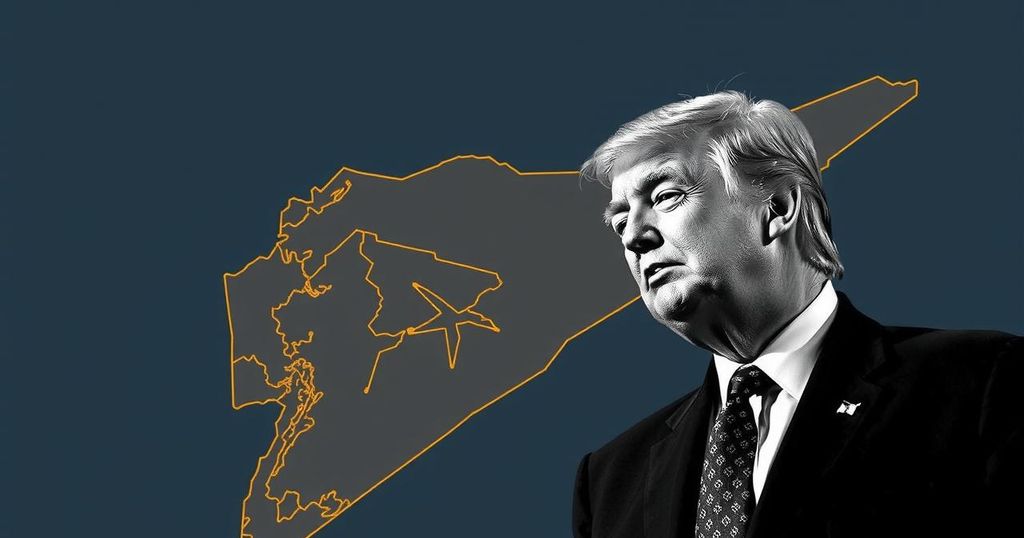Trump’s Intention to Withdraw Troops from Northern Syria Revealed by Kennedy

Robert F. Kennedy Jr. announced that President Trump intends to withdraw U.S. troops from northern Syria to avoid them being in jeopardy during potential conflicts between Turkey and Kurdish forces. During discussions, Trump expressed concerns about U.S. personnel becoming “cannon fodder” amidst regional tensions. This reflects broader shifts in U.S. foreign policy under Trump’s administration following his re-election, raising implications for Turkish-Kurdish relations and the region’s stability.
Robert F. Kennedy Jr. reported that President Donald Trump plans to withdraw U.S. troops from northern Syria, perceiving that their presence might render them as “cannon fodder” in potential hostilities between Turkey and Kurdish combatants. During a recent dialogue with broadcaster Tucker Carlson, Kennedy recounted a discussion he had with Trump on a flight, where Trump illustrated the geopolitical landscape of the Middle East, focusing specifically on the tumultuous border region between Syria and Turkey. Trump noted the disproportionate military presence of Turkish forces, reportedly numbering 750,000, juxtaposed with the 250,000 stationed in Syria. Kennedy emphasized that, should conflict erupt between the Turkish military and Kurdish factions, U.S. troops would be caught in the crossfire. In response to concerns from military advisors about the risks involved, Trump reportedly voiced a clear directive: “Get them out!” This statement comes following Trump’s successful re-election over opponent Kamala Harris, which has raised alarms among U.S. allies regarding potential shifts in American foreign policy, particularly concerning support for Ukraine amidst its struggle with Russia. Since 2014, the U.S. had provided assistance to the Kurdish People’s Protection Units (YPG), teaming up with the Syrian Democratic Forces (SDF) to combat ISIS. However, the YPG is deemed a terrorist organization by Turkey, given its association with the Kurdistan Workers’ Party (PKK). Turkey has actively invaded Syria in attempts to undermine the YPG. Concurrently, the Syrian government has aspirations to reclaim territories lost since the civil war erupted in 2011, further complicating the situation. Presently, the SDF is responsible for detaining over 10,000 ISIS fighters in northeast Syria. Despite these complexities, the U.S. Senate had previously endorsed keeping American troops in northern Syria to monitor Iranian activities in the region. This evolving situation under Trump’s administration may impact the stability of the region significantly, as the intentions to withdraw U.S. military forces could reshape alliances and alter confrontation dynamics in Syria and with Turkey.
The article highlights the recent comments made by Robert F. Kennedy Jr. about President Donald Trump’s intentions to withdraw U.S. troops from northern Syria. This decision emerges amidst longstanding tensions between Turkey and Kurdish forces, particularly the YPG, which Turkey views as a terrorist group. The U.S. military presence in the region has been primarily to support Kurdish forces against ISIS since 2014. However, with shifting political dynamics and the U.S. foreign policy under Trump’s leadership, the implications of troop withdrawal could present new challenges and opportunities within the region. The backdrop of U.S. foreign policy in the Middle East, particularly regarding Syria, considers the complex interplay between various factions including the Syrian government, Kurdish forces, and outside influences, such as Iran. The stakes are particularly high given the ongoing civil war since 2011, which has led to significant geopolitical instability.
In conclusion, President Trump’s expressed intention to withdraw U.S. troops from northern Syria may mark a significant shift in American foreign policy, particularly regarding the ongoing conflicts involving Turkey and Kurdish fighters. Given the complexities surrounding the region, including the relationships between various factions and foreign powers, this decision could have far-reaching consequences. The situation remains fluid, and the global community will be closely observing the unfolding developments as the new administration sets its course in the Middle East.
Original Source: www.middleeasteye.net






